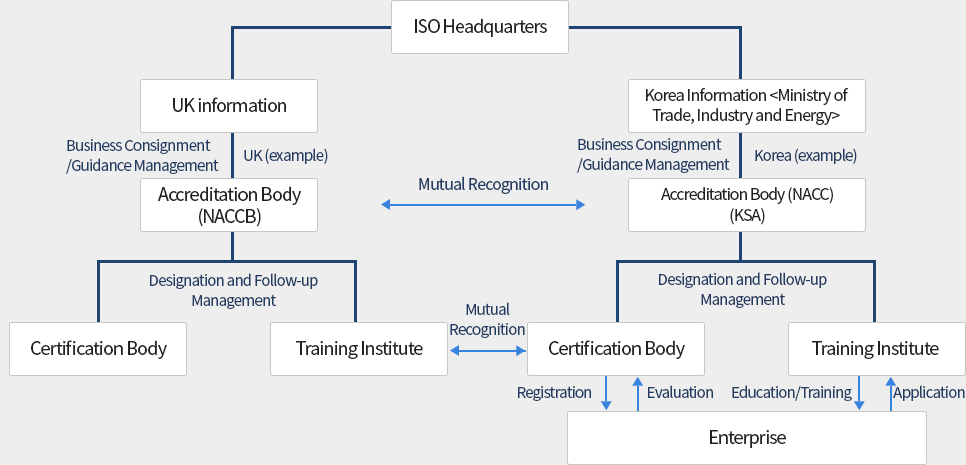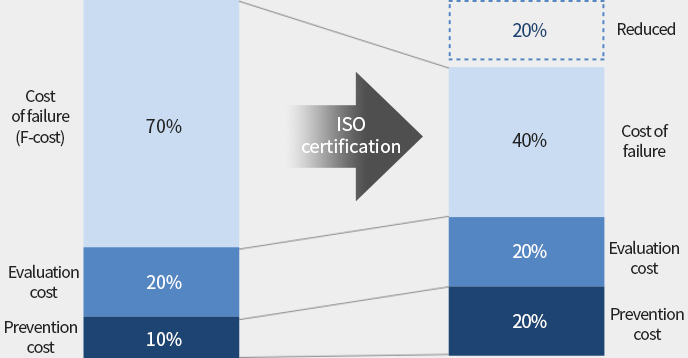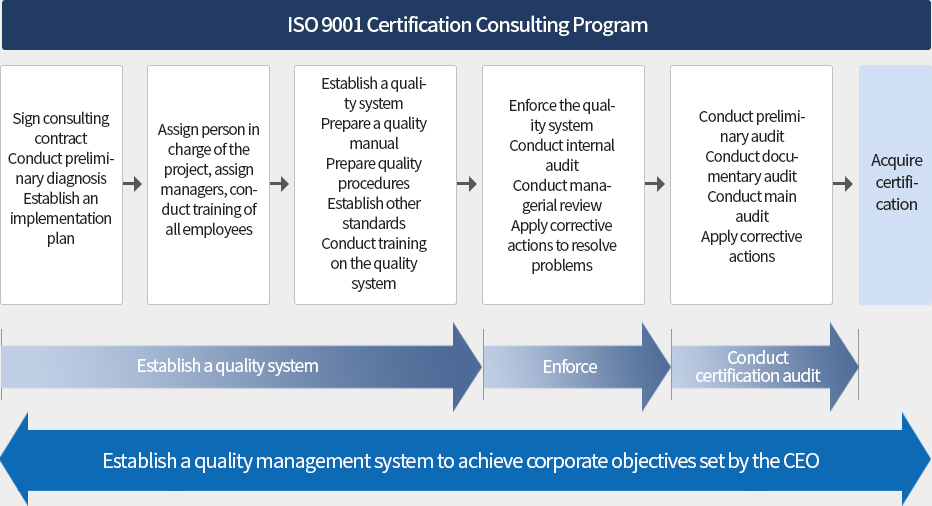Overview
ISO stands for the International Organization for Standardization. As an international standardization organization, ISO’s name is derived from the Greek word ISOS, which means “the same.”
ISO was established on October 14, 1946, after the end of World War II, by 64 representatives from 25 countries to help facilitate international cooperation in industrial standardization. - Currently, 176 countries are participating in the ISO system.
Korea joined as a full member in March 1963, and became a P member (with speaker and voter rights) from an O member (with observer rights only) in 1991.
ISO is an international standard for QM (Quality Management) and QA (Quality Assurance) systems for the production processes of all products (including services, software, etc.). It establishes guaranteed standards for the quality of contract designs, procurement, production, installation, and services.

ISO certification system

Concept of ISO9001
ISO9001 is an international standard for quality management system established by ISO (International Organization for Standardization) and is applied to all products worldwide, in all industries.
ISO9001 certification is a system that guarantees that the quality management system operated by the company is regulated and implemented in compliance with the requirements of the ISO9001 standard by the nationally recognized certification body.
Necessity of ISO9001
The importance of quality is increasing with the increased sophistication of consumers. As such, the ISO9001 certification has become essential as the importance of service quality expands due to intensifying competition in the market. This can help overcome trade barriers caused by differences in industry standards between countries due to the requirement for ISO9001 in the open international market.
Effects of ISO9001
- 1. Increase in sales, overcoming of export barriers by enhancing corporate image
- In a globalized market, most customers require ISO certification as a premise for transactions.
- 2. Increase in internal and external reliability of the company
- Work systems reorganize in a manner that increases public confidence and enhances the self-esteem of employees
- 3. Foundation for quality innovation and technology development
-
- Innovating quality without stabilizing quality defeats the purpose.
- Documenting and managing records to turn individual know-how and information into data and assets (accumulation of corporate know-how)
- 4. Clarification of responsibilities and authority
- 5. Relationship with KSA4000
- 6. Relationship with KSA4000
- 7. Relationship with KSA4000
- 8. Relationship with KSA4000
- 9. Relationship with KSA4000

Support and benefits for ISO9001 certified companies
- 1. The current support measures for companies that have obtained ISO certification are as follows:
-
- 1) Nomination contracts and private contracts possible for products of companies that have obtained certification when engaging with government agencies
- 2) Exemption from factory audit in the case of KS labeling permission examination (Articles 16 and 22 of the Enforcement Rules of the Industrial Standardization Act)
- 3) Included in the criteria for recommendation for military service designation companies
- 4) 40% of the beneficiary standard is applied based on the allocation standard for bulk private contracts
- 5) Granted additional points for preferential treatment by the Korea Technology Finance Corporation
- 6) Granted additional points in accordance with the Construction Technology Management Act (pursuant to Article 47, additional points are given in the case of evaluation of construction capacity and service capacity of contractors)
- 7) Technology expense tax credits granted under the Restriction of Special Taxation Act (Article 9 of the Enforcement Decree of the Restriction Of Special Taxation Act, May 16, 1998)
- 8) Others - Standards for waterworks according to the Water Supply And Waterworks Installation Act applied (items obligated to obtain certification - Materials for waterworks pursuant to Articles 13 and 18 of the Water Supply And Waterworks Installation Act)
- 2. Additional government support items currently under discussion are as follows:
-
- 1) According to the Enforcement Decree of the Regulations on Tax Reduction and Exemption, the Ministry of Finance and Economy is requesting tax reduction or exemption for companies that have obtained certification to include certification maintenance costs (post-management costs) in the current certification acquisition costs (consulting costs, examination costs, etc.).
- 2) The Public Procurement Service has been requested to raise the additional number of points granted to companies that have obtained certification during the qualification examination for pre-bidding for public construction projects (currently 2 points → 5 points, out of total 100 points)
- 3) Ministry of Trade, Industry and Energy and the Ministry of Labor have been requested to prioritize the placement of foreign industrial trainees to companies that have obtained certification
- 4) Requests have been made to raise the additional number of points for companies that have obtained certification from the Korea Technology Finance Corporation (currently 40 points, total 100 points)
- 5) Stakeholders are seeking other support measures under relevant laws
ISO9001 implementation procedure


